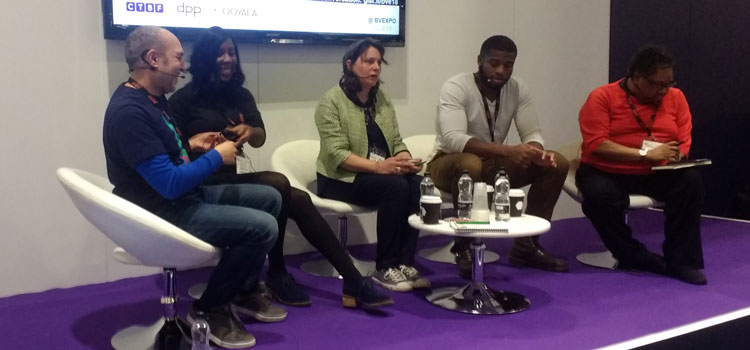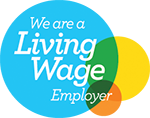
The panel at BVE
Posted by Sharon Elliott on 2 March 2018
Members of BECTU's Black Members' Committee made their mark at a well-attended panel debate on inclusivity in the creative industries, held on Tuesday 27 February during the BVE exhibition at London’s ExCel.
Representing BECTU on the panel was Riaz Meer, a Grierson award winning, BAFTA-nominated producer and film editor. Members of BECTU’s committee were also in the audience.
Freelance writer and editor Pippa Considine led the passionate discussion. Also speaking were Louise King, head of content at social media marketing agency Media Bounty; Josh Wilson, managing director of Wilson Worldwide Productions; and Deborah Williams, chief executive of the TV broadcasters’ Creative Diversity Network.
How much progress has been made?
Pippa Considine kicked off by asking the panel for their personal reflections on progress in the last decade. The session also explored why we must have a diverse workforce and how to reach people who don’t normally have access.
Riaz Meer felt that in television things have gone backwards. In particular, it is becoming harder for black and minority ethnic workers to sustain careers, with a huge demographic drop-off when people reach their 30s and 40s.
He said Creative Skillset figures in 2012 had shown a sharp decline in the number of BAME people working in TV, and Ofcom in 2017 revealed that only 4% of freelances employed by broadcasters are from BAME groups.
Deborah Williams countered this by claiming that the Ofcom report did not look into freelancers. But Riaz referred her to page 25 of the report, where the 4% figure is cited.
Louise King was of the view that there have been improvements in her part of the industry, compared to when she started out as a production assistant. She is seeing more opportunities in marketing, advertising and creative roles, but believes there is much more to do in terms of leadership and decision-makers.
Josh Wilson described how he is pioneering change through the production company he founded, and via his charity, Genisys, which provides young people with opportunities to develop their talents and skills.
Deborah felt there has definitely been progress since she applied for her first job in 1992, but not fast enough, especially in senior roles. She also welcomed more campaigning and lobbying for change.
Project Diamond
Deborah drew attention to Project Diamond, the CDN initiative to gather consistent diversity data on programmes commissioned by the five big broadcasters – BBC, ITV, Channel 4, Channel 5 and Sky.
But Riaz said BECTU, the NUJ and Writers’ Guild are not backing Project Diamond in its current guise because it does not go far enough. The industry needs a good equality monitoring system, he said, but this requires broadcasters to share the data collected at individual programme level, which the employers refuse to do at this point.
Riaz pointed out that the board of CDN is dominated by all the major broadcasters and the independent production companies, under the guise of PACT.
He said that BECTU’s Black Members’ Committee believes the employers were pressured into starting Project Diamond because of the absence of properly published equality monitoring data since 2005 and the consequent crisis in black employment.
However, Riaz claimed, after setting up Project Diamond the employers failed to realise its potential power, and are now frightened of the embarrassment that publishing programme-level data might create. His view was this demonstrates their lack of commitment to effective change.
Deborah countered by claiming that PACT has no influence over the publication strategy of Project Diamond. But Riaz pointed out that John McVay, the head of PACT, is the current chair of CDN's board, and asked the audience to therefore decide for themselves whether PACT has any influence on this matter.
A diverse workforce is good for everyone
Moving on to the difference that a diverse workforce can make, Louise said it leads to more creativity and innovation, and offers a truer reflection of audiences, who are also diverse. For her, mentoring and diverse interview panels are ways to help break down the barriers.
Josh highlighted the commercial benefits of being more diverse. Of his ten employees, six are BAME, including two Chinese, and four are Anglo-Saxon. Seven are women. This has helped bring in business from new marketplaces, including China.
He encouraged individuals wanting to break into the industry to come up with good ideas, pick other people’s brains and take control of their careers. He stressed the need to break down the stigma around TV and people’s perceptions that they can’t get in.
Riaz said diversity is important in its own right, because people need the jobs to put food on the table, and because it is necessary to fight racism.
Employers can take advantage of freelances and casual workers competing against each other. “One of the key things you can do is join your union. We need you, and working together is the only way we can get stuff done.”
He added that BECTU is pressing for some of the government money recently awarded to Creative Skillset for auditing the skills gap to be spent on continuous professional development to help people progress in their careers.
Deborah advocated the value of visiting schools, including outside London, to promote the wide variety of opportunities available. She welcomed efforts to bring in those who cannot afford university, including via apprenticeship schemes, and called for confidence-building initiatives.
Summing up, Pippa said that despite the range of opinions on how to get there, everyone wants the same thing and agrees that “it’s bonkers not to have a diverse workforce!”.
Join BECTU here.
Comments
Sorry, comments are not currently enabled for this post.

